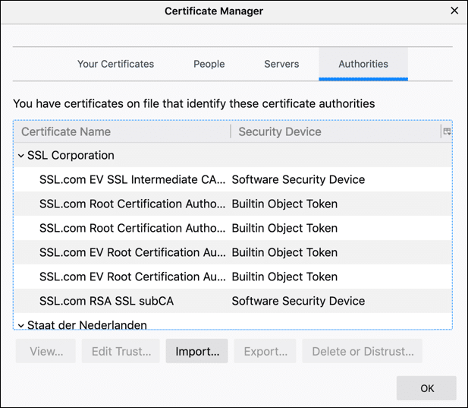A root store is a collection of trusted root certificates used by operating systems and applications to verify digital certificates. It’s essential for secure internet communications and the public key infrastructure (PKI).

Key Points
- Root stores contain trusted root certificates from Certificate Authorities (CAs)
- They validate the chain of trust for digital certificates
- Operating systems, browsers, and some applications manage root stores
- Proper root store management is necessary for cybersecurity
Understanding Root Stores
Function
Root stores verify the authenticity of digital certificates. When you connect to a secure website, your device checks the root store to determine if the website’s certificate is trustworthy.
How Root Stores Work
- Your browser receives a website’s digital certificate.
- It traces the certificate back to its issuing Certificate Authority (CA), then to the root certificate.
- If the root certificate is in the trusted root store, the connection is considered secure.
Types of Root Stores
- Operating System Root Stores:
- Windows: Certificate Trust List (CTL)
- macOS: Keychain
- Linux: Various implementations (e.g., /etc/ssl/certs)
- Browser Root Stores:
- Mozilla Firefox: Has its own
- Chrome, Edge, and Safari: Typically use the operating system’s
- Application-Specific Root Stores:
- Some applications, like Java, have their own
Importance of Root Stores
Root stores are important for cybersecurity because they:
- Establish trust in digital certificates and secure connections
- Enable secure communications protocols like HTTPS
- Help prevent man-in-the-middle attacks and phishing
Root Store Policies
Major root store operators have specific inclusion policies:
- Microsoft Root Certificate Program:
- Strict CA requirements
- Regular audits and compliance checks
- Mozilla Root Store Policy:
- Open submission process
- Transparent decision-making
- Apple Root Certificate Program:
- Rigorous vetting process
- Focus on user security and privacy
Challenges
Root stores, while crucial for internet security, face several significant challenges:
- Compromised Certificate Authorities (CAs): When a CA is compromised, it can issue fake certificates, undermining trust in the entire system. An example is DigiNotar, whose failure highlighted the need for stronger CA oversight.
- Keeping Devices Updated: Ensuring all devices, especially IoT ones, have up-to-date root stores is difficult, leaving some systems vulnerable to outdated or compromised CAs.
- Balancing Security and User Experience: Tight security policies can disrupt users by causing warnings or site access issues, so root store managers must balance safety with usability.
- Cross-Border and Legal Issues: Global differences in encryption laws and government-mandated CAs make managing root stores complex, raising privacy concerns.
- Scalability and Performance: As digital certificates grow, root stores must handle the load efficiently without slowing down systems.
- Transparency and Trust: Root store operators must be transparent about their processes while protecting sensitive information that could pose security risks.
Addressing these challenges requires ongoing collaboration between root store operators, CAs, device manufacturers, and the broader cybersecurity community. As the digital landscape evolves, so too must the strategies for managing and securing root stores to ensure they continue to serve their crucial role in maintaining internet security.
Conclusion
Root stores are fundamental to internet security. They provide the basis of trust for digital certificates. Proper management of root stores is essential for maintaining a secure digital environment.
Stay informed about root store management and follow best practices to enhance your online security. The field of digital security is constantly evolving, so keeping up with the latest developments in root store management is important for maintaining strong cybersecurity measures.

